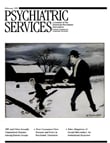Methods of assessing mental health consumers' preferences for housing and support services
Abstract
The authors reviewed 21 studies assessing housing preferences of mental health consumers to examine current methods of assessment, to obtain information on the reliability and validity of the assessment instruments used, and to determine whether a better approach to assessing preferences might be found. The review found little data on the reliability or validity of the assessment instruments and revealed heavy reliance on the use of fixed-choice questions that limit consumer expression of preferences. Responses to such questions can be misleading because they may or may not reflect real-life constraints, such as preferring a roommate only because living alone is not affordable. However, the authors believe the factorial survey model, which uses vignettes to present different combinations and characteristics of living arrangements, may allow investigators to better understand consumers' true preferences. They propose creating and pilot testing an instrument using such vignettes.
Access content
To read the fulltext, please use one of the options below to sign in or purchase access.- Personal login
- Institutional Login
- Sign in via OpenAthens
- Register for access
-
Please login/register if you wish to pair your device and check access availability.
Not a subscriber?
PsychiatryOnline subscription options offer access to the DSM-5 library, books, journals, CME, and patient resources. This all-in-one virtual library provides psychiatrists and mental health professionals with key resources for diagnosis, treatment, research, and professional development.
Need more help? PsychiatryOnline Customer Service may be reached by emailing [email protected] or by calling 800-368-5777 (in the U.S.) or 703-907-7322 (outside the U.S.).



